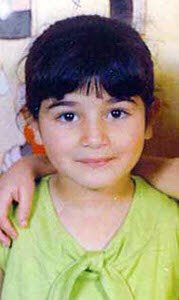Israeli High Court of Justice against Bassam Aramin
Nurit Peled Elhanan, 14 October 2009
On Wednesday we – members of the Combatants for Peace movement, women of Mahsom [Heb. checkpoint] Watch, members of the Forum of Bereaved Families for Peace and writer David Grossman – attended a hearing at the High Court of Justice on the matter of the closing, due to lack of evidence, of the investigatory file on the killing of ten-year-old Abir Aramin about three years ago.
The hearing, which had been scheduled for eleven o’clock and then for nine o’clock and then for ten o’clock and then for one o’clock, began at two. Journalists ran to and fro in the corridor (Who died? A little girl? Really? Excuse me, sir, did your daughter die? Yes. Then you are Bassam Aramin? No, I am Rami Elhanan. Oh, sorry. So where’s that Aramin? And who are you? We are from Mahsom Watch. From what checkpoint? What are you doing here? And who are you? I am a friend. Of those Palestinians? Yes. How come? How can it be? Can I interview you? Did you too have a daughter who died? Really? When? How? What was her name?* And after all that you are on their side?) But at the end of the day no Israeli reported on what happened.
Salwa and Bassam Aramin are not Jews and they are not Israelis. They live under a cruel occupation and they have experienced all it has to offer: exile, imprisonment and the killing of their small daughter Abir by a rubber bullet that was allegedly fired from the rifle of a Border Guard soldier who was sitting in an armoured jeep and thrust the barrel of his rifle through the opening that was allegedly designed for that purpose and allegedly aimed and fired at the head of the girl who was standing beside her sister at a kiosk, allegedly buying candy during the break between the first class and the second. The projectile was removed from under the girl’s body and transferred to the authorities. The eyewitnesses, as well as the Border Guard soldiers, testified that there was no alleged danger to their lives and that the shooting was done – if it was done – in contravention of instructions. Two pathologists testified that it was probable that the fracture in Abir’s little skull could allegedly have been caused by a rubber bullet. The attending physician at the Hadassah hospital said that it was not a live bullet. The video of the reconstruction of the incident was not given to the defence counsel or to the court, because the soldiers who allegedly carried out the shooting, that is, who thrust the barrel of the rifle through the opening that had been made especially for that purpose, aimed and fired at the head of the girl Abir, were featured in the recording.
Counsel for the State, stammering, unprepared and unkempt, stood like a platoon commander in charge of new recruits with her back to the public and refuted the allegations: So they found a projectile. So what? Who knows how long it had been lying there? So people gave testimony, so what? They (those Arabs) can say anything, does that make it testimony? So nobody was throwing stones at that spot, so what? On a nearby street stones were thrown. If you were in my place, she laughingly says to Michael Sfard, Aramin’s attorney, you would have made morsels of them by now.
Morsels.
Judge Beinish reminds Sfard – twice – that there have been such incidents in the past and that soldiers have rarely been put on trial or even indicted, so it would be best to just forget it. The State Counsel, with a laugh: I had the pleasure of attending such trials.
Morsels. Pleasure.
But Salwa and Bassam Aramin have no choice but to seek justice in an Israeli court. They demand that the truth come to light in a court of the occupiers – of the killers. “So that I can rest and so that Abir can rest,” Salwa says to the journalists. The perfect crime, Jean-François Lyotard once wrote, is not only the killing but also the suppression of the testimony and the silencing of the voices of the victims. And the greatest injustice is to compel the victims to seek justice in the court of their tormentors.
As Judge Beinish implied in her comments to Sfard, the blood of Palestinians is cheap in this country. No one has ever been punished for killing Palestinians – children, adults, newborns, old people. The Jewish murderers are all walking among us, free and happy.
Those who have murdered our Israeli children, the Palestinian suicide bombers, have at least said “let me die with the Philistines”* and spared us any questions about their presence in the world. The murderer of Abir Aramin no doubt spent that very evening in a bar (Shit! What a nasty day! A little girl walked right into my crosshairs!), and will continue to spend many more evenings in many more bars, while Abir’s parents seek justice from the occupier, from the oppressor.
My 17-year-old son Yigal sat in the courtroom all day with a shocked expression on his face. That night he took off for Auschwitz with his classmates.
For his sake I hoped, I prayed, I implored, I nearly shouted for the drowsy judges – Beinish, Arbel, Frocaccia – to find a spark of humanity, of motherly feelings, within themselves and to look into the eyes of Salwa, who never stopped crying, and at Bassam’s ashen face, and to say: the High Court of Justice sympathizes with you over the death of little Abir.
They didn’t.
***************************************
* Judges 16:30
* Smadar (13) – the daughter of Ms. Peled Elhanan was killed in a suicide bombing on Ben Yehuda Str. in 1997 (j.h)
Translated from Hebrew by George Malent

